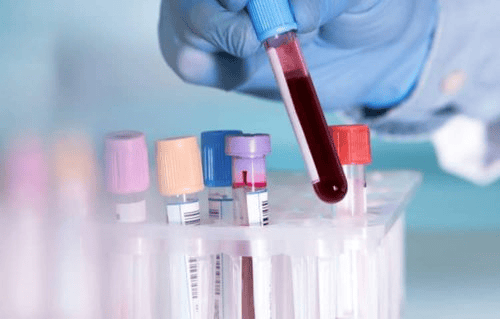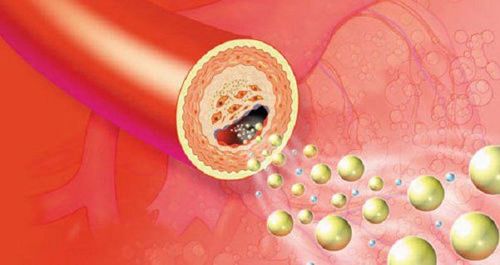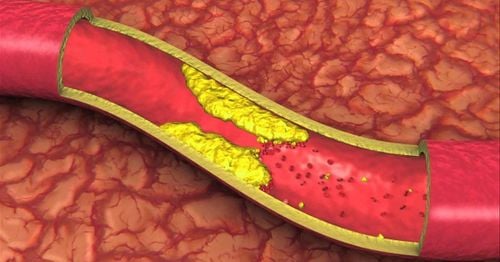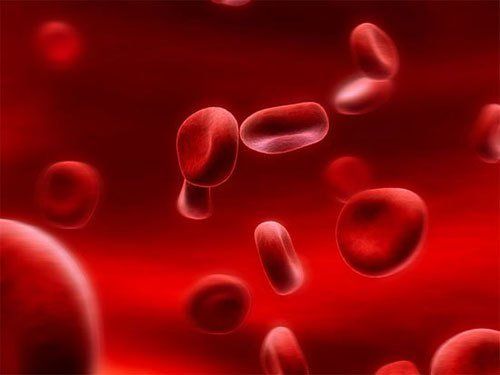This is an automatically translated article.
The article was professionally consulted by Doctor General Internal Medicine Doctor - Department of Medical Examination & Internal Medicine - Vinmec Hai Phong International General Hospital.
Cardiovascular disease has been and is the leading health concern in the world with the leading mortality and disability rates. Most cardiovascular diseases today are caused by atherosclerosis, so the risk factors of cardiovascular diseases discussed are often related to the formation and development of atherosclerosis.
1. What are cardiovascular risk factors?
Cardiovascular disease risk factors are those associated with an increased likelihood of cardiovascular disease. A person carrying one or more certain risk factors means that there is an increased chance of the person getting the disease, not a guarantee that they will get the disease. Often, risk factors go together, promoting each other's development and increasing the risk of disease exponentially. Cardiovascular risk factors are increasing. The following is a list of the major, recognized risk factors for cardiovascular disease.
2. Causes and risk factors
2.1. Unmodifiable risk factors Age: your risk of cardiovascular events increases as you age. Epidemiological studies show that age is one of the most important predictors of disease. More than half of all people who have a heart attack and up to four-fifths of those who die from a stroke are older than 65. Of course you can't shorten your life, but eating right and staying active It can help slow down age-related degeneration.

Gender: Men have a higher risk of coronary heart disease, stroke and other cardiovascular diseases than women at a young age. However, post-menopausal women have a similar risk of cardiovascular disease compared with men. Currently, cardiovascular disease in women is becoming an alarming problem because of our own subjectivity. Heredity (family history of early cardiovascular disease): research evidence suggests that people with a genetic (familial) predisposition to cardiovascular disease or stroke (males before 55 years old and women before 65) have a higher risk of cardiovascular disease than others. See also: Common cardiovascular diseases in the elderly
2.2. Modifiable risk factors Hypertension: is the most common cause of cardiovascular disease and also the most well-studied risk factor. Hypertension is considered a silent killer and is the strongest risk factor for cardiovascular events. High blood pressure often has no symptoms and causes a host of dangerous cardiovascular complications. Hypertension is often associated with other risk factors, especially obesity, increased cholesterol, blood triglycerides and diabetes. In these disorders, one disorder can be the risk of another disorder and vice versa. Good treatment of hypertension greatly reduces its risks. The problem is that the results of hypertension treatment depend not only on the use of drugs, but also on lifestyle adjustments such as weight loss, salt restriction, regular exercise, etc. also make an indispensable contribution. Dyslipidemia: Increased levels of lipids (fats) in the blood (cholesterol and triglycerides) are very common and are one of the most important modifiable risk factors for cardiovascular disease. Total cholesterol includes many forms of cholesterol, of which the two most important are high molecular weight cholesterol (HDL-C) and low molecular weight cholesterol (LDL-C). High levels of LDL-C are a risk factor for cardiovascular disease. In contrast, HDL-C is thought to have a protective role in you, and the lower the HDL-C level in the blood, the higher the risk of cardiovascular disease. Elevated triglycerides, another component of blood fats, can also increase the risk of cardiovascular disease.

Dyslipidemia is often accompanied by other cardiovascular risks such as diabetes, hypertension... The assessment (test) of blood lipid components is very important, should be done at a later age. 40. A reasonable diet, regular exercise, if necessary, drugs to treat dyslipidemia and adjust other risks (if any) are an effective measure to prevent cardiac events. circuit.
Smoking: is a known risk factor for coronary artery disease, stroke, and peripheral vascular disease, although smokers are generally leaner and have lower blood pressure than non-smokers. . Besides, smoking also causes lung cancer and other diseases. Please do not smoke (pipe tobacco), if you do not smoke. If you smoke, quit right away, as quitting is a proven way to reduce your risk of cardiovascular disease. You also need to be aware that passive smoking (when you have to breathe secondhand smoke) is equally dangerous. Overweight and obesity: to varying degrees, both increase the risk of cardiovascular disease. Obesity can influence the formation of other risk factors. The more obesity, the higher the likelihood of predisposing factors for atherosclerosis such as hypertension, diabetes as well as the risk of cardiovascular disease. To calculate your ideal weight, people use your height and weight to calculate your body mass index (BMI). In addition, waist circumference is an important indicator because abdominal obesity is closely associated with other cardiovascular risk factors such as hypertension, dyslipidemia, impaired glucose tolerance and diabetes. Street. Ideally, you should keep your waist circumference < 90cm (men) and < 75cm (women). Reduced glucose tolerance/diabetes: People with diabetes, especially type II diabetes, have a higher rate of coronary heart disease and stroke than the general population. People with diabetes themselves often die from cardiovascular causes. Even a slight increase in blood sugar increases the risk of cardiovascular disease. People with type II diabetes often have high blood insulin levels, and are associated with insulin resistance. Diabetes and insulin resistance increase the risk of hypertension, dyslipidemia, and cholesterol deposition in atherosclerotic plaques. As a result, it promotes the process of atherosclerosis and its complications. In fact, weight loss and exercise have the potential to boost sugar utilization and help you prevent or slow the onset of diabetes. Good blood sugar control (if you have it) will significantly reduce your risk of cardiovascular disease. People who have had diabetes at a young age (called type I diabetes) have a higher risk of kidney and eye damage than coronary heart disease or stroke. In this case, insulin was severely deficient due to pancreatic disease.

Inactivity: A sedentary lifestyle is considered a risk factor for cardiovascular risks. Regular daily exercise of at least 30 minutes has a significant benefit in reducing the risk of cardiovascular disease. Regular exercise has been shown to reduce the risk of a heart attack and improve survival during a heart attack. Exercise also seems to have a positive effect on other risk factors. It is thought that the benefits of exercise include weight loss, increased sugar tolerance, increased heart muscle strength, increased HDL-C levels, reduced stress, lower blood pressure... The recommended exercise is regular exercise (most days), at least 30 minutes per day, vigorous enough exercise (warm body, rapid breathing, moderate sweating). 2.3. Some possible risk factors Stress Estrogen Increased blood clotting Excessive alcohol intake Premature baldness and multiple peaks in men Early menopause in women Race... See also: 20 foods good for your heart
3. Framingham scale
To estimate 10-year cardiovascular risk, the Framingham score was used. The Framingham score is calculated separately for men and women, the parameters in the scale include: age, smoking status, systolic blood pressure, cholesterol levels and HDL levels. After calculating the total score, it is easy to calculate the percentage of the patient's risk of cardiovascular disease within the next 10 years.
In your case, to calculate your cardiovascular risk you need to see a cardiologist, do cholesterol and HDL blood tests to estimate your risk of cardiovascular disease.

4. Modification of cardiovascular risk factors
How can you, along with applying the information we've presented in this article, make sure you're doing everything you can to prevent heart attacks, strokes, and other complications? atherosclerosis? First, with the help of your doctor, you must assess whether you are in a low or high risk group. Many questions you can answer yourself. Do you smoke? Are you overweight? Do you drink too much alcohol? Does anyone in your family have heart disease or high blood pressure? However, to fully assess your own risk level, you need the help of your doctor.
The doctor will measure your blood pressure, will send your blood to be tested for cholesterol, triglycerides, blood sugar, take a history and conduct an examination. Your doctor may record an electrocardiogram or perform a specific test to determine if your heart is enlarged or abnormal. By combining the information obtained about the factors, your doctor will help you determine the total risk. Once risk parameters have been collected and evaluated, a treatment program directed at adjusting for risk factors can be initiated. If you are a person without risk factors and do not have cardiovascular disease, the following simple tips will always help and, if they do, will do very little harm to you:
Follow a healthy diet for the heart, low in saturated fat and cholesterol, more vegetables, fruits, fish... Lose weight if you are overweight. Limit salt intake. Most of us eat more salt than our bodies need. Many foods naturally contain salt or salt has been added during processing. The simplest way, you should limit the salt in food when cooking. Start an exercise program. Regular exercise benefits everyone. Choose a method that suits your interests, time and abilities. Exercise regularly, every day for at least 45 minutes. If you smoke, stop immediately. If you drink alcohol, be moderate. Learn to reduce stress, avoid reacting to situations that can cause stress because it only makes the problem worse. Get regular medical check-ups to assess your risk level. A perfectly clean record of health at any one time cannot guarantee a lifetime that you are disease-free. To protect cardiovascular health in general and detect early signs of cardiovascular disease, customers can sign up for Cardiovascular Screening Package - Basic Cardiovascular Examination of Vinmec International General Hospital. The examination package helps to detect cardiovascular problems at the earliest through tests and modern imaging methods. The package is for all ages, genders and is especially essential for people with risk factors for cardiovascular disease.
Please dial HOTLINE for more information or register for an appointment HERE. Download MyVinmec app to make appointments faster and to manage your bookings easily.













